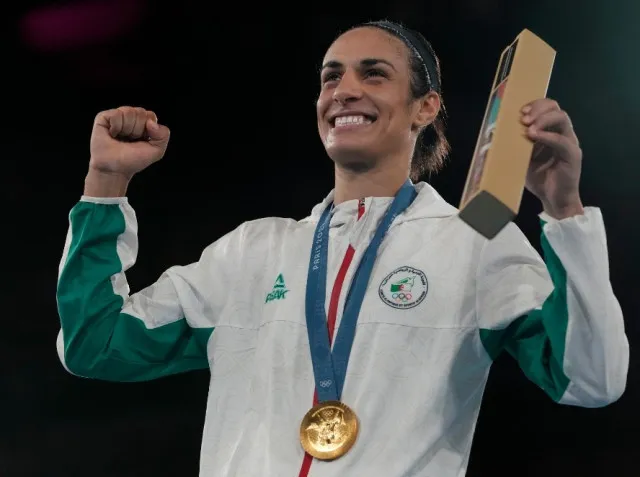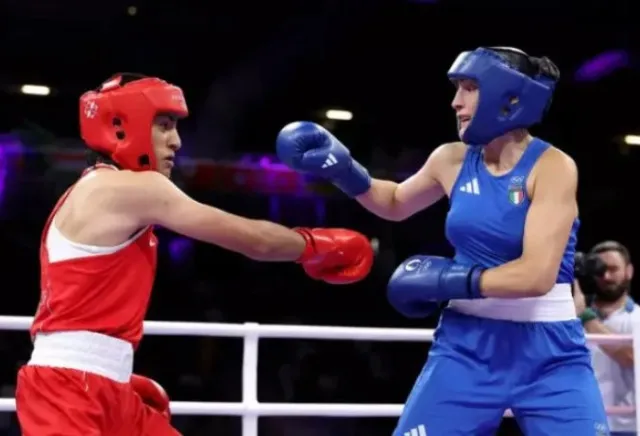The world of Olympic sports has been ignited by a contentious debate after a leaked report questioned the eligibility of Imane Khelif, an Algerian Olympic gold medalist in boxing, over her biological gender. This revelation has added fuel to an ongoing, heated discussion about gender identity and fairness in competitive sports, with many now demanding that Khelif be stripped of her title.
Imane Khelif’s Journey to Olympic Gold

Imane Khelif’s rise to Olympic fame is nothing short of remarkable. Representing Algeria, she claimed a gold medal in women’s boxing at the 2024 Paris Olympics, capturing the world’s attention with her talent and resilience. But her victory has since been clouded by controversy, as questions over her eligibility to compete in the women’s division have surfaced. The situation gained momentum when Khelif, alongside Taiwanese boxer Lin Yu-ting, faced scrutiny regarding her biological sex and eligibility for the women’s category.
Reports have surfaced suggesting that Khelif may possess male biological traits, leading some to claim that she may have an unfair advantage in competition. Though the leaked report remains unverified, it has spurred debate and raised questions about Khelif’s legitimacy in the sport.
The Heated Debate Over Gender Identity in Competitive Sports
Gender identity in sports has become one of the most divisive topics in recent years. With athletes like Imane Khelif facing accusations about their biological sex, questions surrounding who qualifies for women’s sports are more pressing than ever. Khelif’s case isn’t her first brush with this issue; in 2023, she was disqualified from the IBA Women’s World Boxing Championships after DNA tests reportedly revealed that she had XY chromosomes. Despite this, she was cleared to compete in the Paris Olympics under the guidelines of the International Olympic Committee (IOC).
The IOC stands by its decision, stating that Khelif meets all eligibility requirements and emphasizing that her identification as a woman has not been contested by any official Olympic channels. However, critics argue that relying solely on gender identity without considering biological factors could compromise the integrity of women’s sports.
The Match Against Angela Carini: A Controversial Win
The controversy reached new heights during Khelif’s match against Italian boxer Angela Carini. The fight ended suddenly after just 46 seconds when Carini, reeling from the intensity of Khelif’s punches, withdrew from the match. This abrupt exit granted Khelif a direct pass to the quarterfinals, leading to speculation that her perceived physical advantage played a role in Carini’s decision to withdraw.
Carini’s unexpected exit intensified the backlash, prompting critics to call into question Khelif’s athletic capabilities and the fairness of her win. Many argue that Khelif’s power and speed in the ring suggest a physical edge typically associated with male biological traits, reinforcing calls for the need for stricter gender-based regulations in competitive sports.
IOC’s Position on Gender Identity and Eligibility Standards

In response to the mounting criticism, the IOC has reiterated its stance on inclusivity and fairness in sports, maintaining that Khelif met all requirements to compete in Paris. An IOC spokesperson highlighted that all athletes were thoroughly evaluated before the Olympics, including Khelif. The IOC explained that Khelif’s history as a female competitor and her identification as a woman provided sufficient grounds for her participation in the women’s division.
However, the IOC’s position has not been enough to quell the public’s concerns. Many believe that current policies lack the rigor needed to ensure fairness, calling for a re-evaluation of regulations to address biological differences that could potentially give certain athletes an advantage. This debate has garnered attention from sports figures, journalists, and fans alike, with many calling for a comprehensive policy overhaul.
Public Figures and Athletes Speak Out

Several influential figures have weighed in on Khelif’s case, intensifying the debate. British journalist Piers Morgan publicly expressed his belief that Khelif’s gold medal should be reassigned to what he called a “real woman.” Tennis legend Martina Navratilova, a strong advocate for gender equality in sports, voiced a similar sentiment. Navratilova argued that while transgender and gender-diverse athletes deserve a place in sports, their inclusion should not come at the cost of fairness and safety for female athletes.
Navratilova tweeted, “Transgender people SHOULD absolutely have a place in sport, but NOT at the expense of safety or fairness for women.” She underscored the need for preserving the competitive fairness of women’s sports. Sports presenter Laura Woods also chimed in, emphasizing that “Fairness and safety MUST be the MOST important factors in sport. At ALL levels. Including and especially grass roots.” These high-profile opinions reflect an increasing demand for stricter guidelines to address gender identity in sports fairly and transparently.
Imane Khelif’s Response to the Allegations
Despite the mounting scrutiny, Imane Khelif remains steadfast in defending her identity. She has publicly asserted that she identifies as a woman and was “born a woman,” firmly denying any claims to the contrary. In a recent interview, Khelif stated, “I am fully qualified to take part in this competition. I’m a woman like any other woman. I was born a woman, I lived as a woman, I competed as a woman, there’s no doubt about that.”
Khelif has responded to her critics by calling them “enemies of success,” suggesting that their accusations stem from jealousy or an unwillingness to recognize her accomplishments. Her attorney has hinted that Khelif may pursue legal action against those spreading misinformation or making defamatory statements online, indicating her determination to protect her reputation and honor.
The Larger Debate on Gender, Fairness, and Inclusivity in Sports

The controversy surrounding Imane Khelif is part of a broader discussion on gender identity and inclusivity in sports. As more athletes come forward as transgender or non-binary, sports organizations face the complex task of creating policies that balance fairness and inclusivity. This issue is especially contentious in contact sports, where biological differences can significantly impact athletic performance and safety.
The core of this debate centers on finding a balance between inclusivity and fairness. Excluding transgender athletes could infringe upon their rights, but allowing athletes with male biological characteristics to compete in women’s categories raises questions about fairness and the integrity of women’s sports. Khelif’s case underscores the need for sports organizations to address these issues with sensitivity and nuance, developing policies that respect both individual identities and the values of competitive fairness.
Conclusion: Seeking Fairness and Inclusivity in Sports
Imane Khelif’s journey to Olympic gold has been overshadowed by an ongoing debate about gender identity, biological differences, and fair competition. While Khelif stands firm in her eligibility and identity, critics continue to question the fairness of her participation in women’s boxing.
The controversy reveals the challenges sports organizations face in addressing gender identity while preserving the integrity of competition. As sports evolve, the need for fair, transparent, and inclusive policies will become increasingly important. The world will be watching as the IOC and other sports bodies work to navigate this complex issue and create an environment where athletes can compete fairly, respectfully, and inclusively.


